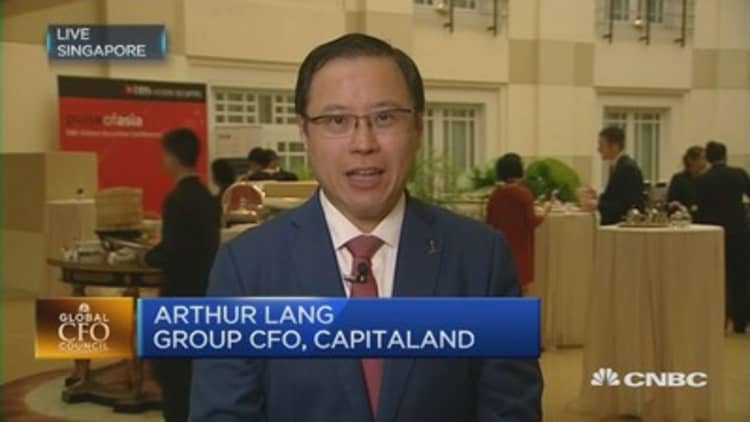
China's property sector has long inspired fears that it's a bubble waiting to pop, but Singapore-based developer CapitaLand is sticking with its bets there.
Singapore-listed CapitaLand, which has developments across Asia, has kept its focus on just 10 cities in China: Shanghai and Beijing make up almost half of the nearly 30-40 billion Singapore dollars ($21-28 billion) of total assets that the developer has in the country, CapitaLand's chief financial officer Arthur Lang told CNBC Tuesday.
"Anyone who has been in these two cities recently will wonder whether there is actually any slowdown at all. And if you throw in the other two top tier-one cities, Guangzhou and Shenzhen, we're about two-thirds to 70 percent situated in these four cities," he noted, adding that only around 4 percent of the company's China assets are in tier-three cities.
"Short term, we are cautious like everyone else is because of all the volatility we're seeing in China," Lang said, noting nearly half of the company's assets are on the mainland. "But in the long term, we're still very confident and very optimistic."
Lang noted that CapitaLand had guided that it would probably have around 14 billion ($2.15 billion) in residential sales on the mainland in 2015 after clocking 11 billion yuan worth in the first three quarters.
Despite long-standing fears over overbuilding, China's property market has shown signs of stabilizing, even in the more stagnant residential sector, with the government backtracking on some cooling measures it put in place to calm the previously overheated market. The People's Bank of China (PBOC) has also cut interest rates repeatedly since November 2014.
Indeed, China's top-30 cities' full-year property sales hit a historical high, with volume up 20 percent on year, according to data cited by Nomura in a note Tuesday.
However, the country still suffers from high vacancy rates in some regions, but these so-called ghost towns are generally located well outside China's largest cities.
Concerns over China increased after Monday's stock market rout, which saw the CSI300 index tumble more than 7 percent, triggering a circuit breaker that halted trade for the day.
One of the reasons cited for the drop was the Caixin Purchasing Managers' Index (PMI), which came in weaker than expected, falling to 48.2 in December; levels below 50 indicate contraction.
"Everybody talks about the PMI, the overall PMI dropping. It has dropped and we expect it to continue to remain a bit weak over the next few quarters. But if you look at the non-manufacturing PMI, which is a function of services, it's actually gone up. I think it's a 15 or 16 month high. And that's positive for us," Lang said.
The official non-manufacturing PMI, released over the holiday weekend, rose to 54.4 in December from 53.6 in November.
"It's positive for our business because we are very much focused on the residential, the shopping mall, the consumption piece of China," Lang said.
"Our retail business, our shopping mall business is still doing well. We're focused always on the mass-market business. We call it the necessity shopping business. We're not focused on the high-end or the super luxury, which you know is suffering now, not only in China," he said.
China's retail sales are expected to have grown around 10.7 percent in 2015, according to a Reuters report citing the Ministry of Commerce, down from 12 percent in 2014.
CapitaLand, which has a market capitalization of around 14 billion Singapore dollars, saw its stock outperform the Singapore market in 2015, with shares finishing essentially flat, compared with the benchmark Straits Times Index falling around 14 percent for the year.
—By CNBC.Com's Leslie Shaffer; Follow her on Twitter @LeslieShaffer1








